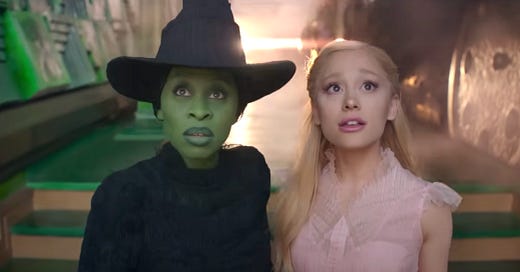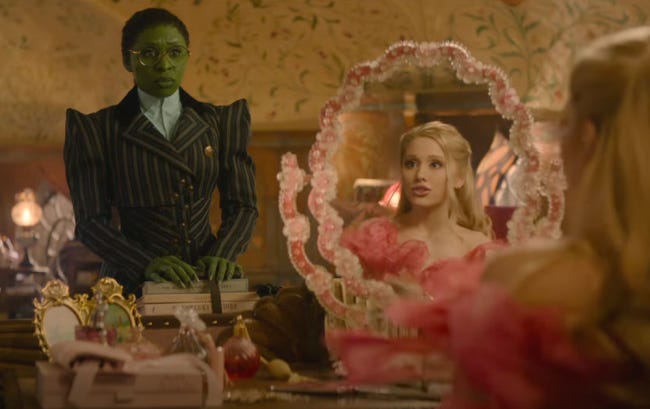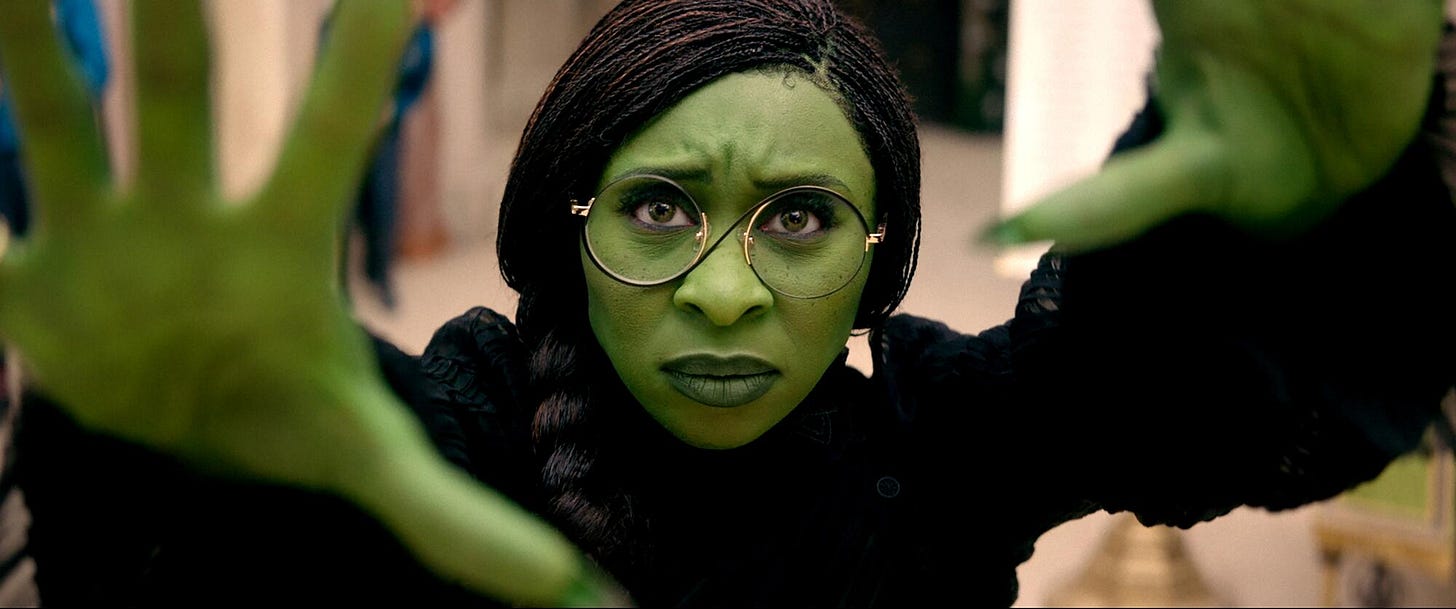Popular. Wicked knows about popular.
Pink goes good with green, and Old Hollywood spectacle goes great with political allegory.
The Short Take:
I was as wary as everyone else, but I am elated to report that Jon M. Chu’s adaptation of the beloved Broadway musical, Wicked, is a smash hit. Cynthia Erivo and Ariana Grande embody Elphaba and Galinda, all the design elements prove that this show was worth moving from stage to screen, and, above all, this big, glossy, Hollywood spectacle accentuates the story’s core themes.
Image Credit: Variety
[The FIRST HALF of this review will be SPOILER FREE. Look at for another bracketed note like this one for a spoiler alert.]
The Long Take:
I’m so happy I could melt.
Not to be crude and disrespectful to my dear Elphaba, but Wicked, which opens in theaters this weekend is face-meltingly good. Against all expectations, Director Jon M. Chu, previously known for Crazy Rich Asians and In the Heights, has his pink and green cake and devours it too. He evokes the Golden Age of Hollywood musicals in intricate technicolor dance numbers, with myriad extras leaping and pirouetting everywhere, yet still uses the camera to place an intimate focus on the film’s two astounding leads. He remains faithful to the source text while still leaving room for new flourishes. His cinematic visualization of this world leans into the idea that this is a film adaptation and as such should go out of its way show things that never would be possible on a Broadway stage.
And yet, Wicked never feels embarrassed to be a musical, tapping into every theater kid dopamine receptor possible. It somehow has the sensibility of the 1939 film The Wizard of Oz AND the stage adaptation of Gregory Maguire’s novel Wicked. Chu’s film is a perfect blend of fantasy, glamor, menace, joy, humor, whimsy, excess, and, most of all, the overwhelming sense of triumph and spirit that I associate with its Broadway predecessor. Tears welled up in my eyes multiple times as I sat in the theater, and I walked out with a huge grin on my face. Not even a few odd lighting choices could bring me down.
For those of you coming to this production of Wicked with very little context, though, it needs to be said that this is only Part One, or the equivalent of Act One in the Broadway show. We’re basically getting a year-long intermission, with Wicked: Part Two arriving in theaters November 21, 2025. Some critics have side-eyed the omission of Part One in the title of this first film, but those very words flash on the screen as soon as the film starts, so I don’t think anyone is going to get to the end and feel as though they’ve been duped into half a story. And, to me at least, it doesn’t feel like only half a story. There is enough of a climax and resolution to make this feel like a self-contained film. Then again, I’ve also felt that way about the Dune and Spider-Verse films. So I may just be more accepting of epic stories continuing across multiple installments.
And Chu’s imagining of Wicked is as a fantasy epic as much as a musical. There’s a lot on offer here for Harry Potter and even Star Wars fans. (If I squint in just the right way, Elphaba starts to look like Rey trying to lift rocks with The Force.) The run-time of Chu’s Wicked, though, is 2 hours and 40 minutes, which is likely the entire run time of the Broadway show. Dramatic scenes have clearly been added, but, again, I never thought it dragged; it always felt as though we were moving forward in the story.
Image Credit: IndieWire
I cannot go a sentence farther without declaring that the central duo of Cynthia Erivo and Ariana Grande, more than anything else, is responsible for holding my attention and keeping the story moving forward. Grande has impeccable comedic timing and brings almost a nervous, fidgety Hummingbird energy to her performance making Galinda both funny and endearing. This is quite a feat because her character is unabashedly a vain and selfish spoiled brat. In the hands of even a mediocre actor she becomes extremely unlikeable. Grande, however, continually steals scenes in the same way that, as multiple critics have said, Ryan Gosling did as Ken in Greta Gerwig’s Barbie. I suspect a similar awards trajectory is in her future.
Some critics have downplayed Erivo’s performance in comparison, applauding her vocal strength but calling her portrayal of Elphaba dour. I do not agree with this at all. Erivo plays Elphaba as tough yet vulnerable, with just a dash of sarcasm. She’s appropriately tailoring her performance to screen rather than stage, relying on subtler facial expressions more than theatrical projection and exaggeration. Her rendition of one of the many show-stopping songs, “The Wizard and I,” has a youthfulness and naivete that I would not have necessarily expected from an actress with so much power and gravitas. If the Best Actress race weren’t so crowded this year, I would say she’d be a slam dunk for a nomination. She certainly deserves one.
The strength of two individual performances does not a Wicked movie make, however. Elphaba and Galinda must have chemistry with each other because the entire story hinges upon the ups and downs of their relationship. If you don’t buy these two together, then the stakes of the plot suddenly evaporate. Erivo and Grande clearly have an ineffable bond, both on screen and off, as they hold hands in support of each other during interviews or show off all the matching tattoos they got during filming. As Elphaba and Galinda, they play off one another perfectly, sometimes with odd couple comedy and sometimes with heartbreaking dramatic conflict. The way that they look at each other and sing together convinced me that these two characters see each other completely and understand each other deeply.
All of this — everything I’ve said thus far — is obviously important for the film’s success. None of it would matter, though, if, at its core, Chu’s Wicked did not capture the core emotional beats of Stephen Schwartz’s (adapted) story. And to me, the core idea of the original show and the feeling that makes the music so powerful is one of otherness. From the moment she was born, Elphaba’s green skin has set her apart from everyone else; people gasp when they see her, and her own father recoils and resents her. So in order for this movie to work, I need to feel Elphaba’s loneliness and isolation resulting from her status as someone considered different, or, as a literary critic might say, an Other. And with every close-up of Cynthia Erivo’s face and with every note of every song she sang, I could feel the weight of her otherness.
As a scholar, I was introduced to the concept of otherness by postcolonial theorist Edward Said’s Orientalism, which essentially goes through English literature and shows how representations of non-Western cultures are typically presented as a contrast to or binary opposite of Western culture. Or, more pejoratively, how colonial subjects have been positioned as alien and exotic in a way that establishes a power dynamic between West and East: “European culture gained in strength and identity by setting itself off against the Orient.” Said takes the basic philosophical constructs of the Self and the Other and gives them a cultural valence of West and East. If we’re reducing his ideas to embroidered throw pillow terms, it’s like a toxic version of yin and yang: the West defines itself in opposition to the East and defines the East as everything it is not. One cannot be defined without the other.
Image Credit: LA Times
Importantly, these constructs do not reflect reality; rather, they merely create a rhetorical narrative that establishes a balance of power. Said argues that “as much as the West itself, the Orient is an idea that has a history and a tradition of thought, imagery, and vocabulary that have given it reality and presence in and for the West.” And even if you’ve only seen the trailer for Wicked, you know that there’s clearly an attempt to mold and shape cultural conceptions of Oz that inevitably comes at the expense of some while benefiting others.
[SPOILER WARNING: I am about to discuss details of Wicked’s plot. If you’ve seen the trailer, though, I don’t think anything about to say counts as a spoiler. Grrr. I really wish trailers had more faith in us and didn’t tell us the entire plot of the movie.]
More specifically, The Wizard publicly others Elphaba. Once he realizes that he will not be able to exploit her powers to fuel his own agenda, once he realizes that she will question his authority rather than blindly do his bidding, he swiftly pivots to mount a smear campaign that presents her as the Wicked Witch of the West. One of the most chilling moments of the third act of the film is when Madame Morrible, on The Wizard’s behalf, announces to anyone (and this is a musical, so that means everyone) listening that Elphaba’s outward appearance is a physical manifestation of her inner evil, her monstrous character. This is a thoroughly medieval way of thinking, of course, as literature and art of that period frequently claimed that physical difference or “abnormality” reflected some kind of moral deviance or sin.
Through Madame Morrible’s broadcast and all the propaganda we see in circulation, The Wizard is able to leverage his own popularity with the people of Oz to, as Said would say, build a “tradition of thought, imagery, and vocabulary” that irreversibly defines Elphaba in binary opposition to him: he is wonderful and she is wicked. So much so that by the time we get to The Wizard of Oz, that rhetoric has calcified into presumed truth.
I should note that Elphaba’s green skin does not signify membership of a race or ethnicity within the fictional world of the story, but I think that’s potentially more potent because the artifice with which the Wizard transmutes a very individualized difference into an Orientalist idea becomes even more obvious. He effortlessly weaponizes Elphaba’s otherness to create The Wicked Witch of the West, public enemy of Oz.
Regardless of what green skin signifies, however, we can say that the story does, in fact, align Elphaba with a racial/ethnic group of a kind: the talking animals. In fact, this may even be a deliberate emphasis of Chu’s, as we get a lot more screen time with a wider variety of animals in his longer adaptation. In particular, we see Professor Dillamond, a goat voiced by Peter Dinklage, meeting with other animals in secret to discuss the Wizard’s efforts to silence and subjugate all the magical creatures in Oz. In this sense, Elphaba becomes the resistance leader of an entire group of othered beings that the Wizard presents as having to be domesticated in a very paternalistic, very imperialist way.
And that is why — to bring this discussion back to the emotional efficacy of this adaptation — Cynthia Erivo as Elphaba belting out “Defying Gravity” hits so hard at the end. Because we’ve spent all this time watching her cope with otherness, ridiculed, dismissed, or bullied by others. Because we’ve spent all this time watching her build a seemingly impossible friendship with Galinda and finally feel as though she can be accepted. Because we’ve seen her complete faith in the Wizard shattered when she realizes he’s behind the very problem she thinks he can solve. And instead of losing all hope, she steels herself and becomes more self-assured, more powerful.
One could argue that the ultimate tragedy of this story is that even if we can understand each other better and become friends with those who are different, the rest of the world has other plans that can easily undermine that humanity. But the climax of this film is a transcendent moment of non-conformity. Glinda may not want to rock the boat (and will clearly be rewarded for falling in line), but Elphaba chooses to defy gravity. And if Chu does not set up our identification with Elphaba’s otherness, that moment plummets to the ground, falling flat for the audience instead.
As I look ahead to the rest of this Oscar season, I realize that I vastly underestimated this movie’s ability to meet the moment and serve as if not a political allegory then a political catharsis post-election. Many critics and pundits have been searching for the “mood” of the Academy, and in particular voters who are disappointed in the outcome of the election. I’ve heard endless references to the time Moonlight won over La La Land in 2016 and what ideological baggage could have contributed to that outcome.
I’ve been listening to Wicked’s soundtrack for so many years that I never associated the story with a particular historical period; it was a timeless fantasy story that offered a fresh perspective on an iconic character from literature and film, and that was all. But watching Chu’s adaptation in the theater this week made it abundantly clear that this film can serve as an outlet for Oscar voters because it offers all the balm of escapist fantasy while also offering a sufficiently figurative (and therefore comfortably distant) echo of what many voters will consider the political narrative of this year. I think you can guess whom The Wizard represents, but perhaps I’ll just leave it to Chu himself to explain the parallel that he sees.
Image Credit: New York Times
Emblematic (or metonymic?) of the film itself, Galinda’s best song, “Popular” (and I don’t think that’s controversial to say) is a perfect example of how Wicked can cut both ways, straddling the fantasy/political allegory line in a pretty stealthy way. At face value, that song is a comedic vehicle for Ariana Grande to show off Galinda’s charm, as she preens and prances around her and Elphaba’s dorm room. An iconic clip that I’m sure we’re going to see thousands of times is of her swinging from a chandelier while doing a split. She’s wearing what is arguably her flounciest pink costume and most of the lyrics highlight the allure of the superficial so central to this character. And yet, by the end of the film, it became clear to me that this number also serves as a dark thematic through-line. What seems like an innocent romp, a musical theater dalliance, later manifests with a much weightier consequence. It is not Elphaba’s talent that is rewarded. The Wizard’s reign peddles meritocracy like snake oil but in reality only rewards those who are… popular. Galinda says so herself:
To think of
Celebrated heads of state
Or specially great communicators!
Did they have brains or knowledge?
Don't make me laugh!
They were…. popular!
Please!
It's all about popular
It's not about aptitude
It's the way you're viewed
So it's very shrewd to be
Very very popular
Like me!
It makes perfect sense that Glinda is a prime candidate to be just like The Wizard, beloved by all without question. If you’ll recall, the opening scene of the film, which sets up the frame narrative of Glinda telling the story of her and Elphaba at school, Ariana Grande brilliantly delivers a half-hearted, somewhat sarcastic:
“It’s good to see me, isn’t it?”
It’s almost as if Glinda is secretly judging the people of Oz for worshipping her at this point. For valuing the false promises of popularity more than talent, knowledge, and moral righteousness. How many Oscar voters might recognize their own frustration and disillusionment and put Wicked at the top of their ballot?







